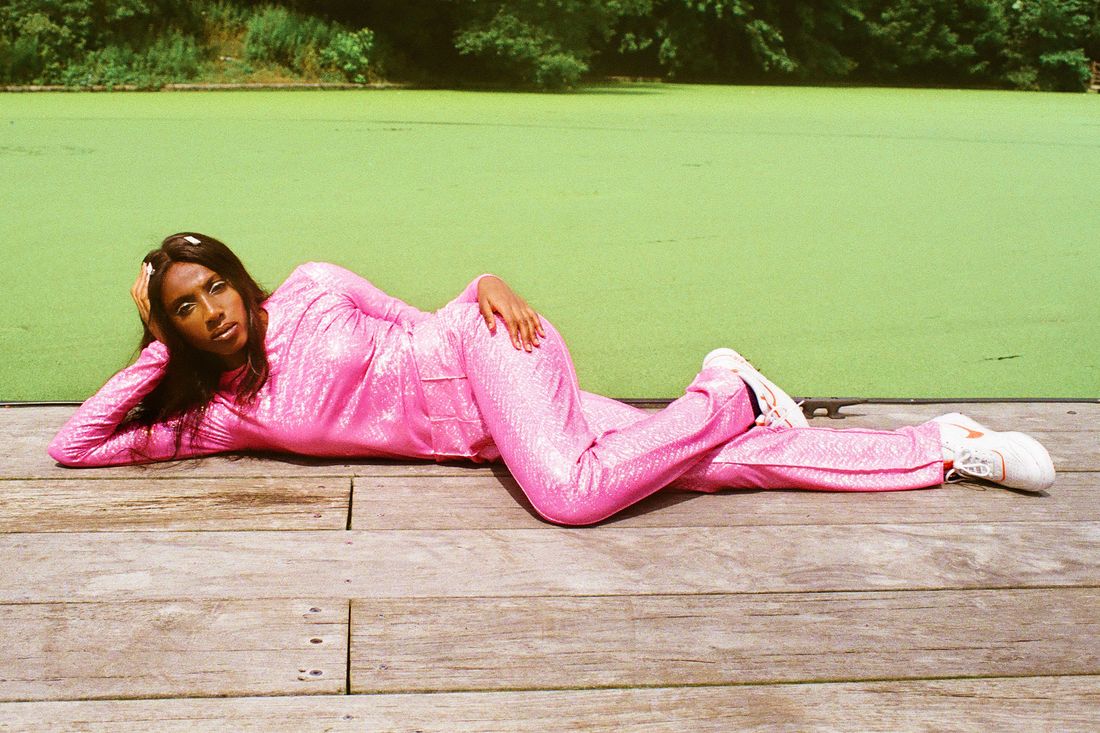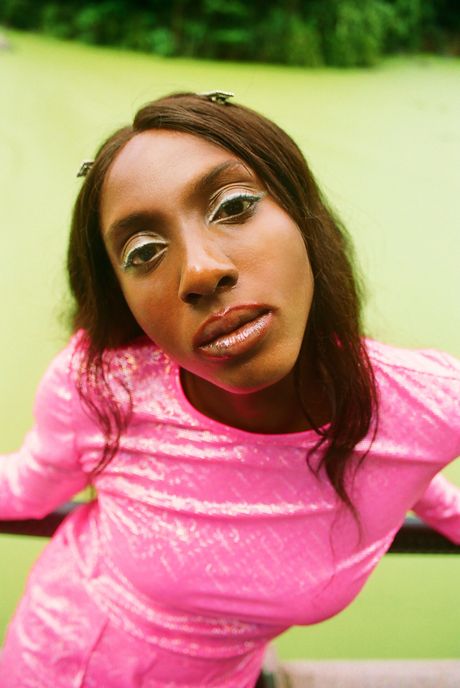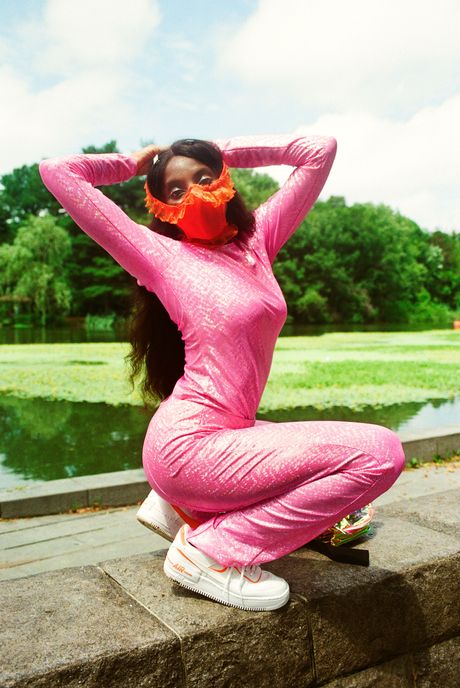
I get wild DMs,” Ziwe Fumudoh tells me as she scrolls through her phone. There are suggestions for guests on her Instagram Live show, where she asks subjects discomfiting questions about race: Candace Owens (“I could see it working in studio”), Rachel Dolezal (“The time to talk to her was 2015!”), or some random racist person (“My audience would be confused”). There are those who ask her to do emotional or intellectual labor for them when Google is just a click away. Then there’s a certain flavor of kink, where “men specifically ask me to dominate them in this race way,” she says. “There is a humiliation fetish.”
She has dressed the part: an all-black outfit (tube top and bike shorts), cowboy hat, and, for the pièce de résistance, latex gloves that stretch to her elbows. We’re sitting across from each other at a picnic table in Brooklyn’s Herbert Von King Park. She peers at me over a black face mask fringed with lace, her eyelids lined with white and pink. It is, I point out, a very “comedy’s dom” look, which is what her friend and fellow comedian Alex English calls her. It was accidental, she swears! She’s just attracted to texture!
I can’t see if she’s smiling, but I can tell she is because she has the kind of impish look that has made her guests wriggle and squirm on her must-see Thursday show, which has managed to crack the code of how to do successful comedy on Instagram Live. The moments are delightful or stressful (or both), depending on your mileage for Schadenfreude. She presents people with a standard questionnaire that includes a pop quiz about historical figures — “Who is Marcus Garvey?” “Angela Davis?” — and more personal ones like, “How many Black friends do you have?” or “Qualitatively, what do you like about Black people?” The most incendiary clips float to Twitter, where they operate as confirmation bias that Fumudoh has successfully “baited” someone — Slave Play author Jeremy O. Harris looking gooped by the question “Why do you hate Black women?” (he blamed his response on a poor internet connection), cookbook author Alison Roman visibly reddening as she struggled to name five Asian people, social-media influencer Caroline Calloway nervously asking Fumudoh to “please say something very nice” after their interview went off the rails.
“I love that interview,” she says of Calloway’s in particular. The influencer screamed, “Let’s fucking go!” as she named books from a list of nine Black authors she had recommended on Instagram (four of which she says she had actually read). When Calloway said she deserved an “ally cookie,” Fumudoh replied sternly, “There are no cookies in this game.” She appreciates the Calloway interview in the same way she appreciates how children are natural comedians. The purity of spirit! The innocence! It is in the failure where one strikes comedy gold. “There’s so much value in what she offered, intentionally or unintentionally,” she says. “I really could not have written better jokes.”
Fumudoh, 28 (“19 for the record!” she says. “Goo-goo gah-gah!”), is making comedy that speaks to a chaotic and internecine cultural moment, but she has been doing the hard work of trolling white people for years. The Instagram show is a new iteration of the Baited video series she launched in 2017, when she first declared her intention to “interview my white co-workers and make them feel uncomfortable about race” at the SNL-adjacent YouTube comedy channel Above Average. In subsequent iterations, the videos became slicker and more harebrained: She would play games with fellow comics, like identifying which vegetables are “racist or delicious” and refashion the game “Fuck, Marry, Kill” as “Enslave, Appropriate, Silence.” Fumudoh has an edgelord spirit, but it’s less “Here’s something racist” and more “You’re something racist.”
That said, she discusses the Instagram Live show in more benign terms — slightly crunchy and less anti-comedy provocation. “I want to bring healing, but that’s a little earthy,” she says. “I don’t really think I need to trap anyone into saying anything racist. They volunteer that information — for better or for worse!” Her logic is that because everyone, including herself, is racist, any discomfort is simply human. She filmed the first Baited video the day after Donald Trump’s election, what she considers the point of no return. “It was a watershed moment in my politics and understanding that the ‘Yes, we can’ of Obama was over,” she says. “I couldn’t see a world where this comedy exists without Trump becoming president and undercutting everything we thought we knew about America.”
The Instagram show has been a way for Fumudoh to reverse the power dynamics that have shaped her life. Born to Nigerian immigrants in Lawrence, Massachusetts, she grew up middle class. As a kid, she participated in pals, a program for middle-schoolers at Phillips Academy, where she would eventually go as a scholarship student and receive a formal education in well-intentioned liberal racism. She attended Northwestern after that, studying African-American studies and poetry before diving into the comedy scene in New York. “As a Black person in the Northeast, you’re taught that racism does not exist, and you’re constantly being gaslit into thinking, This is in your head. You’re just being sensitive,” she says. “This live show is a confrontation, like me reparenting myself, like, ‘Now that I have my third eye open, I can see and confront these demons.’ ”
While doing stand-up in New York, Fumudoh specialized in a kind of aggressive cringe comedy — an Andy Kaufman type who never lets up. “I have gotten through life as a Black woman in white spaces by being extremely controlled,” she says. “My comedy is about power. It’s having to listen to a Black woman and not being able to make me stop. ‘For the next 15 minutes, I’m the captain now!’ I’m very Captain Phillips with that.” In 2018, I watched her perform at the Bell House, where she opted to sing her original song “From Melania to Sri Lanka” six times in a row. The first time she sang it, the crowd thought she was done. Polite applause. She did it again and asked for audience participation. It wasn’t enthusiastic enough, so she did it again. People shifted nervously; a few tried to put their backs into it. She can’t hear you. Again! A fourth time! Haha! At this point, the crowd polarized: Some stood and participated, while the vast majority were annoyed that this woman was exhorting them to scream, “I wanna shop with Melania in Sri Lanka!” Was this the joke? Of course, this was all just a bit of comedy jiujitsu; if you observed how she’d dominated a crowd that was dividing like an electoral map, you might think it was hilarious.
Last year, during a variety show for a mostly white Brooklyn audience celebrating Obama’s birthday, Fumudoh improvised a song, set to an instrumental track of will.i.am’s “Yes We Can” and accompanied with a PowerPoint presentation, about how she missed the president. “People loved it,” she says. “And I was like, No! You don’t get to watch my Black pain and be entertained!” So then she decided to perform the “Melania” song over and over and over again until people walked out. “I’ve done the song 13 times back to back to back,” she says. “People get enraged with me. I’ve been banned from shows. But I like interacting with my audience. I like feeling alive! Rage or joy — I want a reaction.”
What the Instagram Live videos have done is reframe the audience; instead of being part of a group forced to participate in a sing-along, we can watch a subject wither under her gaze. Still, the live format creates an intimacy: Even if you’re not the one fumbling for answers, the second-hand mortification makes you wonder what it would be like to be in that situation, either as the questioner or the respondent. Any collateral humiliation is her way of upending the racial hierarchy. What if people had to be held accountable to her? And what if she weren’t nice about it? And absolutely asked questions in bad faith?
“My existence is annoying, and I get under people’s skin, but I like the control of being able to decide when I can get on other people’s nerves,” Fumudoh says. She operates on instinct, so her actions depend on her mood. “If you catch me on the wrong day, I will fucking beat your ass. When people are racist in front of me, I will badger them. I’ll be like, ‘Did you know master bedroom is because of slave masters? Did you know that in Central Park, all the land was taken from Blacks?’ I’ll give you random facts because I want to make you feel bad about racism!” she says. “Maybe it’s like the Hulk and you have to get me in the right mood and I’m like, ‘Hulk mad! Hulk crash!’ I’m Mark Ruffalo.”
More often than not, though, Fumudoh says, she tries to be nice. “I think that as a host, I have to be gracious and appreciate that if someone comes on and lets me ask them about race point blank, that’s a gift,” she says. “I consider that a gift.” Part of what has made the show fascinating to watch is white people willingly participating in a game of light public humiliation. The dynamic that has taken shape after a trio of formerly canceled white women — Calloway, Roman, and Rose McGowan — appeared on the show is that one could do “well” or “badly” depending on one’s answers. I ask if she felt the Instagram Live show would become a way for people to launder their reputations. “I don’t know,” she says. “Are these people better off for having spoken to me?” She regrets not following up on Roman’s assertion that there were no Black people at Bon Appétit, particularly after The New Yorker critic Doreen St. Félix tweeted that she was there during Roman’s tenure. Fumudoh emphasizes that she’s not a journalist. “I’m just a comedian cosplaying!” she says.
And while she asks questions tailored to each subject (for Roman: “Would you consider yourself the Christopher Columbus of food influencing?”), there is a repetition to her line of inquiry, which means guests can catch on to the bit. Future iterations will require shifting the goalposts to constantly keep people off balance. (To wit, she recently threw in the first Democratic female presidential candidate, Shirley Chisholm, as a historical figure to quiz guests on.) Harris was booked so the show wouldn’t become a white women’s redemption tour. She’d love to do a live-to-tape late-night variety show, which would mean she’d likely have a team of researchers to help her. (Harris has sent her a proposal to do it as a theater show.)
We begin walking north toward her apartment, and she checks her phone, which is pocketed inside a pink protector that makes it look like a ’90s-era brick. “I’m Dionne!” she says. “My entire personality was stolen from Clueless.” I ask if Stacey Dash, the actress who played Dionne and is a vociferous Trump supporter, will be on her show next.
“Is it interesting to watch a Black woman tear another Black woman down?” she asks, her eyes twinkling. “What do you think? I could!”
*This article appears in the July 20, 2020, issue of New York Magazine. Subscribe Now!



